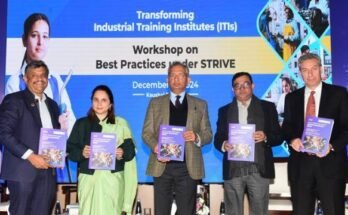“We are second in the world in the aviation industry, as far as traffic and number of aircraft is concerned showing that in the next 10-20 years, there is great potential in this sector,” said Anant Kumar Hegde, Union Minister of State for Skill Development & Entrepreneurship.
Addressing a seminar ‘Aviation Industry: Opportunities, Challenges, growth Potential and the Way Forward’ organised by Bangalore Chamber of Industry and Commerce (BCIC), Hegde said: “The aviation sector is a budding industry in the country. In the last 5-10 years, we have opened doors of opportunities. The sector has the maximum number of by-products and associate industries. This makes it imperative for us to work on this industry.”
He added, “The civil aviation industries from Germany and France have shown interest in signing an agreement with us. But for skilling in the aviation sector, the minimum requirement is engineering or post-graduation degree. To cater to this industry we have planned to start separate skill universities, opened by the private sector under the PPP model. Government will not start these universities. This will ensure that the syllabus stays relevant and quality is maintained.”
Road map needed
Emphasising the need to provide a road map for Skill India, Ashok Saxena, Chairman, Aerospace Aviation Expert Committee, BCIC, said: “Aligning industry demand and workforce productivity with trainees’ aspirations for sustainable livelihoods, creating a framework for outcome focused training and providing pathways for re-skilling and up-skilling workers in identified sectors and to enable them to transition into formal sector employment are key areas.”
Devesh Agarwal, Vice President –BCIC, said “India is emerging as one of the largest aerospace-aviation markets of the world. Global aerospace aviation majors are eyeing India to set up manufacturing, design engineering, MRO facilities leveraging India’s low-labour cost, young and talented pool of engineers, technologists and designers, among others.”
He further said: “Skilled manpower is most critical and vital for the development of a high-tech industry like aerospace and aviation. This has been recognised by the chamber in full measure. To this end, BCIC has pro-actively pursued with the NSDC, and has set up a Sector Skill Council in the field of aerospace and aviation at Bengaluru; the city being the aviation capital of the country.”
Defence procurement
Setting the theme for the seminar, Saxena said: “Defence procurement policy makes it mandatory to have a minimum of 30 per cent offset obligation. As per current indication the generated defence offsets in the next 10 years will be in the range of $30-40 billion. Offsets will facilitate export of manufactured aeronautical products, software packages, engineering services, creation of joint ventures, infrastructures, etc. Joint ventures / strategic partnerships are recommended for offset liquidation. It is here India, particularly Karnataka, can take advantage of the huge opportunities it offers in the coming years.”
Note: News shared for public awareness with reference from the information provided at online news portals.



